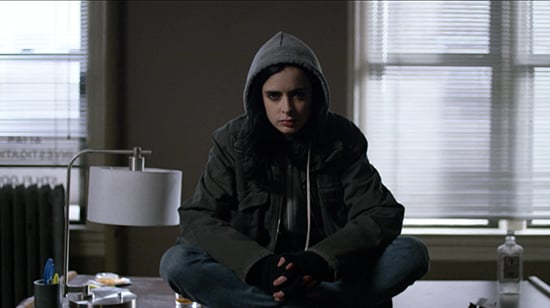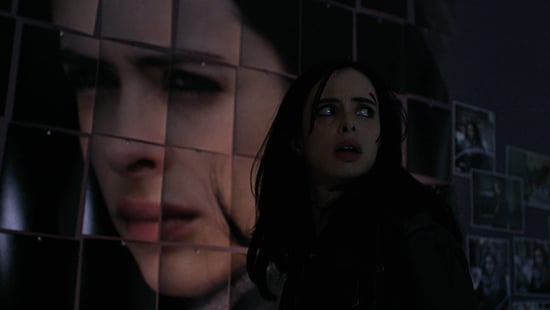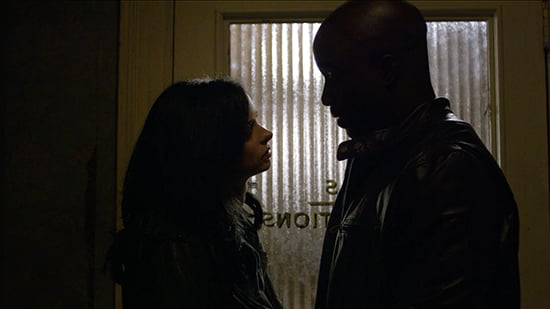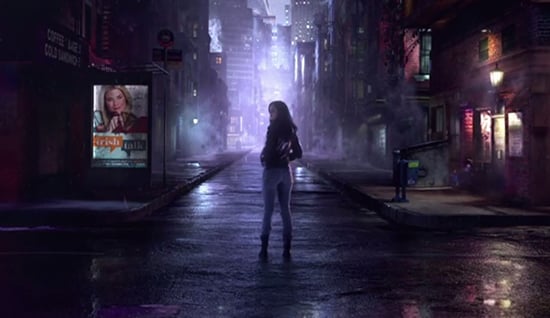Your Own Strength
By:
December 7, 2015

You don’t have to have seen Netflix’s Daredevil series to know what’s going on in Marvel’s second serial for that service, Jessica Jones — but it does tell you a lot about the evolution of the cinematic superhero genre. What Daredevil did for violence, Jessica Jones does for sex — and Jessica Jones does for gender what no drama in this artform has before.
Daredevil went where powerful men fear to tread too — stretched out from the tortured-toughguy shorthand of the earlier movie into a truly novelistic series of 13 (a form it convinced me works best for this genre, which after all is grounded in periodic fiction and defined arcs), DD was a textured psychohistory of how males deal with emotional damage — through violence, and lashing out, and turning the whole world into allies and enemies. Jessica Jones is about how women deal with similar trauma — through survival, and inner fortitude, and contemplation of who they can connect with. In these narratives, men typically have been deprived — Matt Murdock was robbed of his dad and eyesight, Wilson Fisk was poor and had no fatherly affection — a form of lost (or never granted) entitlement; in the real world, women are attacked — sexually abused, denied personal growth, restrained by cults — their story begins with violence, so they have to transcend rather than “triumph.” There have been a few well-represented women superheroes put on the screen of late (Selma Blair in the Hellboy flicks, Charlize Theron in Hancock, Zoe Saldana in Guardians of the Galaxy, Adrianne Palicki on S.H.I.E.L.D.), but Jessica Jones is the first work of this type to fully explore what it is that makes women heroes.

The source-comic, Alias by Brian Michael Bendis & Michael Gaydos, is by acclimation one of the finest ever made, and Jessica Jones matches its moody layers and sour, steely empathy. You can’t call a show starring an action-heroine Alias now of course, and Marvel went the right route just calling her who she is — names are important, they’re the opposite of statistics. (In a perceptive re-conception of Marvel’s comic canon, Jessica’s best friend here is ex-tween-celeb, now socially-aware radio talkshow host “Trish,” that is, Patsy Walker, the company’s answer to Archie from the 1940s–’60s and later the impish superhero Hellcat, but for much of her career just an ordinary-seeming woman in series titled only with her real name.)
Jessica has in fact gone in the opposite direction — giving up a failed, fitful superhero career to go under the radar as a private eye, sinking into the oblivion of drink and anonymous sex between collaring petty offenders. (On the often-broken door-window of her seedy office on the show, the letters still say “Alias Investigations.”) In reality women must wear many masks, few of their choosing, but the hero of Jessica Jones has no real way to hide.
At one point in the comic, she fell under the influence of Killgrave, a mind-controlling minor villain (originally from Daredevil’s comic, as fate would have it) who Bendis & Gaydos turned into a truly terrifying phantom of our fear of losing our selves. Netflix-series creator Melissa Rosenberg has wisely made him the central villain, a symbol of the manipulation that powerful but unseen men exert from shadows on society’s course and women’s psyches. A narcissistic would-be romantic and genteel, unaccountable rapist who can make anyone hand over their money, bodies, life, he is present in Jessica’s mind even when she is separated from him by miles or his apparent death (the abuser’s truest victory), and in Krysten Ritter’s wounded, tenacious performance we see this battle rage across her face and in her movements, beyond any superhero brawl. Ingeniously composed camerawork makes the world move out from under her; sometimes swinging in circles around her; sometimes queasily detached from a scene of her running and seemingly shaking at a different angle from hers; sometimes going out of focus in patchwork areas of the frame.
Struggle is the center of her existence, even as she seeks to drop from sight — an abrasive personification of New York, she confronts the classic P.I.’s array of surly workmen and dysfunctional neighbors with hilarity to counterpunch the show’s horrors, and she is very aware of (though is at a loss to coherently process) the affirmative and negative in all souls — she uses and advises “it’s not your fault” as a mantra for herself and other survivors of Killgrave’s coercions, but also never forgives herself; when one character says to her musing about good and evil, “Way I see it, most people got both goin’ on, just depends on which part wins that day,” she seems calmed, and understood, as at no other time.

That character is Luke Cage, a Blaxploitation icon from Marvel’s well-meaning and clueless early ’70s turned quintessential hero of color in the modern era; Jessica’s lover and eventually husband in Alias and subsequent comics. It’s the next step in the milestone of superhero mass-media that the entire Netflix project has been so far, putting first a disabled hero, now a strong woman, and (in the next series) this symbol of super-personhood at center-stage (how they’ll portray the wannabe-Asian billionaire philanthropist/kung-fu master Danny Rand in the fourth series, Iron Fist, should be fascinating). Jessica’s withdrawal from life is not healthy, but, uniquely for American popular fiction, her solitude is not characterized as a flaw — the lone woman is a prize at a restaurant table and a threat in business and politics, but when a mechanic tells Jessica, translating his own Polish proverb, “Rude girl is lonely girl,” we cheer to hear her crack back “Countin’ on it.”
And her connection with Luke is one that is struggled into — in some of the most natural, unapologetic sex ever seen on TV (how did it happen that only Marvel-freakin’-Studios so often gets this right?), the early encounters are ambivalent, and the echo of hurt is the lure. After a bar-brawl they both take part in (this Luke owns a dive in which he keeps his powers and their consequences out of sight), Luke reveals his special abilities to Jessica by breaking a buzzsaw on his abs followed by ferocious affection initiated by her; the two titans destroy beds; like the first sex between Rooney Mara and Daniel Craig in the U.S. version of The Girl With the Dragon Tattoo after she has tended to his terrible injuries, it’s as if Luke and Jessica are fetishizing the violence they’ve been through and then ritualizing how it can be overcome. Luke, like Jessica, has a tragedy in his past, and they first come together over their alone-ness and then bond over the strengths they can’t show to others and the wounds that superpower could not stop. They are reaching an even more difficult common ground; most superheroes personify social values and ideals, while Luke (a performance of stunning emotional containment and wary humanity by Mike Colter) and Jessica embody the waning legitimacy of maleness and its powers, and the emerging, embattled female voice and its wisdoms. In the superhero series that feels more real than any before it, they are two reluctant paragons who understand that the important part is finding a way for the fight to end.
That reconciliation to breaking even, part resignation to human nature and part recognition of human needs, is the imperfect, honest morality of the show; Jessica breaks-and-enters to get knowledge and items she has to have, and breaks rules of what is supposed to be acceptable human interaction — but with her various sketchy, junkie friends, she shows how humans should be accepted, even if they can’t be “saved.”
The attitude is figurative counterpart to the sheltering shadows that are a hallmark of noir — postwar, pessimistic; great victory followed by aimless drift in the trauma of what the conflict cost — and Jessica Jones carries it like a penitent cloak, the urban-gothic legacy trailing behind her and all these private, lonely “I”s. The locales are squalid and classic, the lighting bloodily fluorescent and rain-slicked, the angles severe and vertiginous (straight down a skyscraper, up from the bottom of spiraling stairs), the framing of every scene the best cross-evolution from comics I’ve ever seen — not literal boxes as in Ang Lee’s botched Hulk, but the crack of a closet-door, the circle of a drain as seen from inside the pipe — the mute stage of reality that we are half-seen in and which will remain after we disappear.
The war comes home in the best of Marvel’s media — we first see Sam Wilson/The Falcon in the Winter Soldier movie counseling Afghanistan/Iraq-era vets with PTSD, and in Jessica Jones an ex-special ops guy becomes one of the damaged male leads when the adventure-seeking Trish/Patsy and Jessica go after the villain. The fitful stages of recovery, or not, will be familiar to anyone who has survived trauma, like a frightening mid-series tantrum Jessica has with two people who are also acting out on their own tragedy, but in their case as coldly as Jessica is furious. These are the causalities of feeling you have to “go it alone” and then staying that way. There are at-first unsuspected, past ties between Luke and Jessica and between Jessica and Trish that should be discovered by watching the show; suffice it to say that the model-student former Patsy and the bad-influence Jessica give both the innerly troubled whiz kids and the basically good headcases in the audience something to cheer for and understand about each other.
As Trish, Rachael Taylor proves herself series-worthy with a nuanced and resolute portrayal of the adored, stereotyped celeb who longs to make a genuine difference; trapped in ways more genteel but no less constricting than Jessica. As in most of the comics, Patsy/Trish technically has no superpowers, though in the show we not only see her get enthusiastic oral sex from a jarhead cop, but immediately be able to find a space to leave her car next to Madison Square Park at lunchtime. Seriously, though, the unashamed yet unexploitative portrayal of female desire, especially framed as uncontradictory for this former-America’s-sweetheart character, is fairly unheard-of in the whole crime-drama canon; not coincidental, I’m sure, to the above-average proportion of women writers on this series. (The arc of how Trish stands up for her own safety, as well, is one that will be applauded for what it asserts real women can claim.)
Similarly, Carrie Ann Moss in a self-possessed, stony performance as Jessica’s semi-ethical lawyer is an out, powerful lesbian given full human dimension and not vilified for her identity (she does enough to be vilified for as the series progresses). This is the series where you’ll hear the most conventionally girly-glamorous character, Trish, not some marginal comic-relief feminazi, say things like “Men and power, it’s seriously a disease,” and “Last night was fun, but that doesn’t mean I want your opinion.”
The shame visited on these characters is not sex but love — David Tennant as the super-stalker Killgrave makes your skin crawl off and hide under a chair; the (hmmm) lady-killer figure of hardboiled-detective/James Bond fantasy revisited as haunting creep from a vantage-point very rare in noir (that of the women who are usually the plot-devices and props at the margins).

As the series goes on, Hitchcock-level suspense (bad example of a sexually-harassing genius, but we’ll take what we need from him) keeps Jessica, Killgrave, the victims he’s created and the innocents she feels responsible for in a maze of pursuit, imprisonment, escapes and psychological warfare whose next moves you will never see coming, though you may recognize their feeling from the intrigues and evasions that people feel forced upon them when getting out from the shadow of an abuser or their own damage. It’s one of many ways in which this series redefines the stakes of thrillers and pulp — not mere physical self-preservation and restoring of some elusive, ill-perceived status-quo, but existential perils faced by those whose existence itself is something they always have to fight to be acknowledged.
Killgrave embodies the essence of control, and self-possession is the central question of this series — the tangle of what the abused feel they “let happen,” and what dominators blame their own victims for, and of retaliation that keeps the aggrieved in the emotional grip of their attacker, and of manipulation that draws the wronged into sympathy for the monster that is displaced from that which he didn’t show you, goes well beyond Killgrave’s symbolic power to overtake others’ will. He’s a destroyer who never experiences remorse, while Jessica is a protector who never lets go of her guilt; a sad switch and not an uncommon one between those with the untroubled freedom to do wrong and those whose idealistic conscience will always make them feel they fell short. Especially among survivors who identify with their abuser or internalize his view of their worth. What people do with their choices, and how much of “choice” is really free in a world of competing self-interest and unacknowledged predators, are the mysteries Jessica Jones truly investigates.
Every woman who has been endangered, every man who has misunderstood or violated boundaries, everyone who’s ever been exploited by a sociopath, or knows anyone else who has, will see something familiar in this series, though anyone who’s had to become acquainted with the way the system fails survivors of rape and harassment will not be able to avoid the feeling that it isn’t superpowers, but the ability to confront your attacker, that is the fantasy here. Imagination, though, is what articulates what we need and sets the parameters of what should be done about it, and the discussion dramatized on Jessica Jones is nearly revolutionary. All of Marvel’s movies and TV shows have not been power fantasies but power critiques; still, Netflix is establishing itself as the Vertigo to Marvel’s marquee mainstream, and while the movies are often a masculine narrative of grand problems resolved through symbolic conflict (like, say, the Ramayana or the Hebrew Bible, each of which have their heroines in the mix), Jessica Jones is a feminist paradigm of conflict lived-through, with an emphasis on the life.
And that life’s fragility — a trail of characters you care about will be left as bodies by the end, personalizing the mass, numbing carnage we see in men’s wars and women’s disappearances, from Syria to serial-killings. Addiction, abortion, widowhood, rape culture, child-abuse, all are dealt with in the least lecturing way imaginable, and plenty of the violence done by women to other women under patriarchy’s pressures (or, sometimes, just equal-opportunity character flaws) is portrayed too. Typical crime fiction is about tragedy’s violent closure; Jessica Jones is about violence’s consequences. The hero is not he who prevails, but she who survives.
Ordinary people’s vulnerabilities and defects, which don’t cease with the acquisition of elevated status or ability, are the weakness that can defeat any of us before we start, and the reaction of the un-superpowered to the show’s compromised adventurers and outlaws — resentment, admiration, emulation, fear — is a source of tension at all times (especially in the transformative arc of Eka Darville as Jessica’s addicted neighbor and unlikely guardian, a portrayal of stoic dignity that has much to say about how we can step up from other kinds of dependency, on authority figures, on the idea of champions).
Jessica Jones’ characters are trying to follow the unwritten map of how to be heroes, but their forbidding path gives us some missing pages for the unfinished handbook of how to be human.
